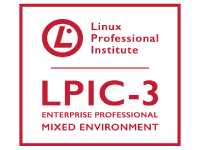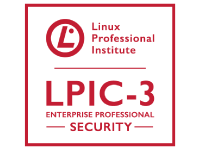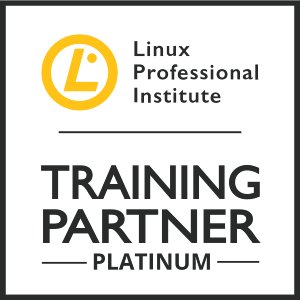Use the code ‘FIREBRAND15’ at checkout for 15% off this month only!
15% Discount AvailableUse the code ‘FIREBRAND15’ at checkout
Linux Professional Institute LPI Level 3 (LPIC-3) & Security
Code: lpic3mes
What you'll learn
Get your LPI Level 3 (LPIC-3) certification 40% faster than traditional training. This course offers you the opportunity to take two exams and become a specialist in both the Mixed Environment and Security areas of LPI Level 3. In just six days you'll get the highest level Linux certification in the industry and receive two LPIC-3 specialty qualifications.



If you're a professional working with Linux on an enterprise-level and you are up for the extra challenge of getting certified in two fields, this course is for you.
In the Mixed Environment Specialisation, you'll learn how to:
- Configure, maintain and troubleshoot Samba
- Use OpenLDAP as an Authentication Back-end
- Manage Samba users
As part of the Security Specialisation, you'll cover topics including:
- Cryptography
- Application Security
- Access Control
- Operations Security
- Network Security
This accelerated course is developed with feedback from hundreds of Linux professionals and the world's leading technology firms. The two LPIC-3 exams will test your skills in authentication, troubleshooting, network integration, capacity planning and Linux security. Once you've passed your exams, you'll be able to apply your skills to any standard Linux system.
Curriculum
42 modulesOn this course, you'll get hands-on experience and walk away with two LPI Level 3 specialty qualifications. You'll gain knowledge and essential skills in these key topics:
LPIC-3 Mixed Environments Specialisation:
Topic 390: OpenLDAP Configuration
- 390.1 OpenLDAP Replication
- 390.2 Securing the Directory
- 390.3 OpenLDAP Server Performance Tuning
Topic 391: OpenLDAP as an Authentication Backend
- 391.1 LDAP Integration with PAM and NSS
- 391.2 Integrating LDAP with Active Directory and Kerberos
Topic 392: Samba Basics
- 392.1 Samba Concepts and Architecture
- 392.2 Configure Samba
- 392.3 Regular Samba Maintenance
- 392.4 Troubleshooting Samba
- 392.5 Internationalisation
Topic 393: Samba Share Configuration
- 393.1 File Services
- 393.2 Linux File System and Share/Service Permissions
- 393.3 Print Services
Topic 394: Samba User and Group Management
- 394.1 Managing User Accounts and Groups
- 394.2 Authentication, Authorisation and Winbind
Topic 395: Samba Domain Integration
- 395.1 Samba as a PDC and BDC
- 395.2 Samba4 as an AD compatible Domain Controller
- 395.3 Configure Samba as a Domain Member Server
Topic 396: Samba Name Services
- 396.1 NetBIOS and WINS
- 396.2 Active Directory Name Resolution
Topic 397: Working with Linux and Windows Clients
- 397.1 CIFS Integration
- 397.2 Working with Windows Clients
LPIC-3 Security Specialisation:
Topic 320: Cryptography
- 320.1 OpenSSL
- 320.2 Advanced GPG
- 320.3 Encrypted Filesystems
Topic 321: Access Control
- 321.1 Host Based Access Control
- 321.2 Extended Attributes and ACLs
- 321.3 SELinux
- 321.4 Other Mandatory Access Control Systems
Topic 322: Application Security
- 322.1 BIND/DNS
- 322.2 Mail Services
- 322.3 Apache/HTTP/HTTPS
- 322.4 FTP
- 322.5 OpenSSH
- 322.6 NFSv4
- 322.7 Syslog
Topic 323: Operations Security
- 323.1 Host Configuration Management
Topic 324: Network Security
- 324.1 Intrusion Detection
- 324.2 Network Security Scanning
- 324.3 Network Monitoring
- 324.4 netfilter/iptables
- 324.5 OpenVPN
Prerequisites
In order to receive your LPIC-3 certification you must have an active LPIC-2 certification. However, you can take the LPIC-2 and LPIC-3 exams in any order. To successfully obtain your certifications, you must have experience in installing and maintaining Linux.
Exam info
You'll sit the following exams:
- LPI LPIC3-300: Mixed Environment
- LPI LPIC3-303: Security
Course Dates
Sorry, there are currently no dates available for this course. Please submit an enquiry and one of our team will contact you about potential future dates or alternative options.
FAQs
4 questionYes, we do provide courses suitable for beginners. However, Firebrand's accelerated courses aren't easy and it's essential that you are interested and actively pursuing a career in IT.
Traditional training providers usually run their courses from 9am to 5pm. At Firebrand Training we maximise the number of learning hours to minimise the number of training days, so you’ll be back to your job as quickly as possible. You don’t waste time travelling to several courses and finding an exam centre after that.
Firebrand's accelerated courses are constantly reviewed. We ask our delegates for feedback after every course. We are official partners with leading vendors and therefore, we're provided with certification changes and updates, which we can then implement in our course delivery at a very early stage. This feedback is then analysed in view of changes or discrepancies. We will then address the topics mentioned and have a panel of subject matter experts provide us with valuable suggestions for improvement and solutions.
If you need to learn new skills and you want to be able to put them into practice quickly, then Firebrand is the right training company for you.
Our unique accelerated training method means that we are your fastest way to learn. By delivering training for up to 12 hours per day, seven days per week, with exam centres on-site, we ensure that you are trained and certified quicker than anywhere else, having spent less time out of the office away from the day job.
Can't find the answer you're looking for?
Our expert learning advisors are ready to help. Whether you need course recommendations, have technical queries, or want to discuss your learning goals, we're just a message away.
Related courses
All Linux CoursesTrain your team
Since 2001 we've trained 134,561 employees from thousands of large and small organisations, saving them more than one million hours in training time.
Learn More